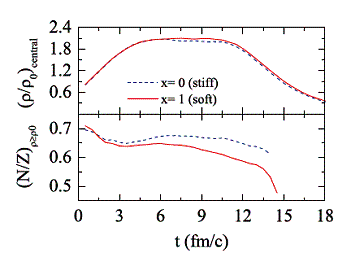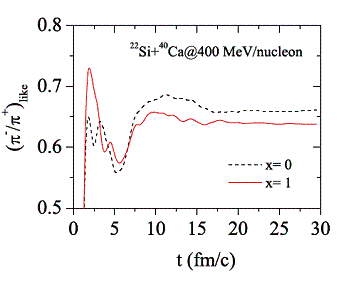The researchers in Institute of Modern Physics, Chinese Academy of Sciences (IMP) have investigated effects of symmetry energy on proton-rich reactions at intermediate energies.
It is found that the symmetry energy affects π+ production more than π–. More interestingly, compared with neutron-rich reactions, for charged pion ratio and dense matter's N/Z ratio, effects of symmetry energy in the proton-rich reaction show contrary behaviors. The practical experiment by using the proton-rich reaction 22Si+40Ca to study nuclear symmetry energy is also similar.
One generally thinks that proton-rich reactions are not very suitable to study nuclear symmetry energy owing to stronger Coulomb effects. Based on a transport model we find that compared with the neutron-rich reaction, the proton-rich reaction can also be used to study the effects of symmetry energy, but contrary behaviors are shown in proton-rich reactions. Figure 1 is the central baryon density and isospin asymmetry N/Zof high-density region of proton-rich reaction, in which the contrary behavior of effect of symmetry energy is clearly presented. Figure 2 shows the charged pion ratio's behavior in proton-rich reaction 22Si+40Ca, effect of symmetry energy is also clearly displayed.
Studying the Equation of State of asymmetric nuclear matter by proton-rich reaction expands the methods of symmetry energy studies. Also the formed proton-rich matter can be used to check the theory of nuclear matter.
The work has been published in PHYSICAL REVIEW C84, 014607 (2011)
The article can be linked as follows:http://prc.aps.org/pdf/PRC/v84/i1/e014607

Figure 1 Central baryon density (top panel) and isospin asymmetry N/Zof high-density region of proton-rich reaction (Imaged by IMP).

Figure 2 Evolution of charged pion ratio of the proton-rich reaction 22Si+40Ca at a beam energy of 400 MeV/nucleon. x=1 denotes soft symmetry energy, x=0 denotes stiff symmetry energy (Imaged by IMP).

